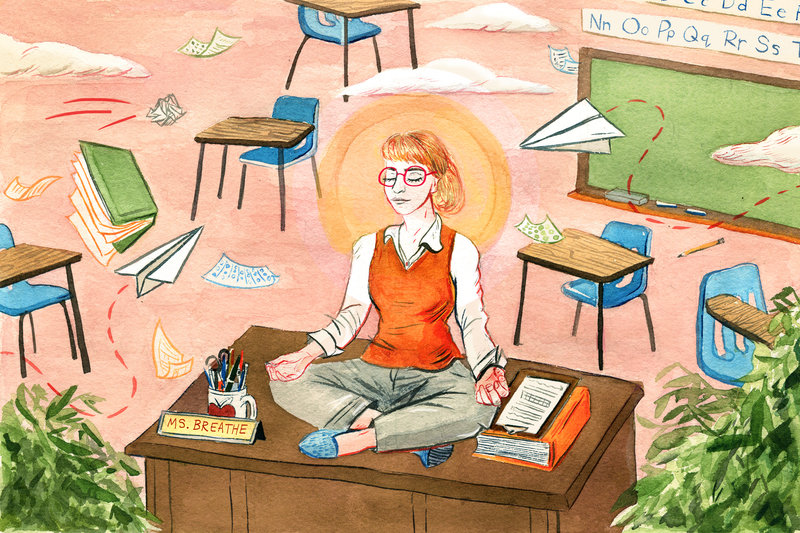It has been and continues to be an extraordinary time for us, especially for teachers.
Before COVID-19, one in four educators described their work as ‘very or extremely stressful’ and one in three educators leave the profession within the first five years.
Why Anxiety and Depression is Common Among Educators
Prolonged periods of unmanageable stress are a precursor to anxiety and depression. Genetic factors also play a significant role in determining our susceptibility to mental illness but no matter where you land on the genetic spectrum, a toxic external environment can bring even the most resilient people to their knees.
Starling Minds™, a fully-online cognitive behavioral therapy platform, has treated thousands of educators who came to their breaking points with anxiety and depression due to workplace stressors. While every story is unique, there is often a perfect storm of external and internal factors that can lead to mind crippling anxiety or soul-wrenching depression.
Here is a brief list of the external pressures that educators commonly discuss in Starling Minds’ online community:
- Increasing behavioral issues and violence—70% of educators have experienced or seen violence in the classroom. Closely correlated to classroom violence is the rising prevalence of mental illness in students, which is why 95% of educators believe that youth mental health should be a number one priority for federal funding.
- Complicated classroom composition—to cater to all learning abilities and levels, educators now manage up to twelve individualized learning plans.
- Declining classroom resources—as classroom support dwindles, educators have less support when it comes to managing the growing diversification in learning styles and behavioral issues in the classroom.
- Increasing demands and groups to appease—from parents and students to peers and administration, educators answer to groups with rising expectations.
- Growing job insecurity—this is especially true during collective bargaining periods, funding cuts and looming job action.
- Increasing disciplinary hearings and legal risks—teachers are now worried about being summoned for disciplinary hearings or legal threats from parents.
Within Starling Minds’ online community, an educator using cognitive-behavioral therapy (CBT) to build resilience to stress shares:
“The last five (school) years of my life have truly been a perfect storm. I’ve been living with an unmanageable level of stress for a long period of time and my battery is completely drained. I’ve put the demands of my school and my students first and have not taken care of myself—my mental health has suffered as a result of this.”
An educator across the country responds:
“Thank you for sharing…I’m in the exact same boat. It’s comforting to know that we’re not alone. I wish we were having these conversations out in the open. It’s so characteristic of educators to hold it together for everyone but themselves.”
The Current State of Educators’ Mental Health
According to our data compiled of over 600 educators, many are experiencing a lot of stress and anxiety around both work and general issues:
- 61% of educators are experiencing high levels of stress
- 66% have been unable to control or stop their worrying on some days
- 37% feel nervous, anxious, or on edge nearly all the time
Physically, COVID-19 has been causing:
- 30% of educators have concentration problems
- 26% are having difficulties sleeping
- 20% have muscle tension and headaches
“My battery is draining because of anxiety from continued pressure from parents at work, increased work responsibilities, and a compromised immune system.” – K-12 Educator
“I’m experiencing a prolonged lack of sleep and major muscle tension. How am I supposed to de-escalate stress from everything that’s unexpected?” – K-12 Educator
An educator’s role in a virtual classroom has shifted their responsibilities significantly. They are not only educators but have taken on the role of IT and a source of information for parents. This is on top of the work-life balance stressors (i.e. disruptions during virtual classroom time) every parent is facing.
- 61% of educators want to manage their uncertainty and worry
- 54% want to feel more motivated and less overwhelmed
- 41% want to set and maintain better boundaries
How We Help Educators Succeed in Complicated Conditions
Before COVID-19, one in five students in an educator’s care suffers from at least one mental health problem or illness. Educators hold the power to impact the mental health of these students. But to do so effectively, they need to develop knowledge and competencies to identify and manage their own mental health struggles.
70% of educators believe that they have not received adequate professional preparation in mental health education. As a result, they feel unable to sufficiently understand or appropriately respond to students’ mental health needs as well as their own. Pre-service and in-service mental health literacy is imperative for both educators and students to succeed and for communities to flourish.
In parting, we leave you with two comments from educators in Starling’s community with a gentle ask to consider your educators and administrators: Do they have the evidence-based tools they need to properly manage their own mental health?
“Each day, when I work with our students with developmental delays, we practice the strategic breathing practice I’ve learned in Starling, and it is a highlight to the day. I can return to my VP duties, feeling confident and refreshed.” – Vice Principal
“Starling Minds is really helping. I really appreciate seeing and reading others’ comments too. Knowing that we are not alone and that we are working together on improving our days feels empowering. Thank you for the CBT strategies to take steps to move forward and become stronger.” – K-12 Educator
To learn more about how Starling Minds™ is helping educators build mental health literacy while becoming more resilient to stress, anxiety, and depression download our case study.




